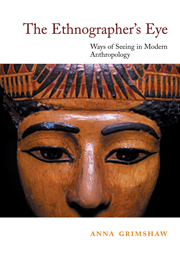Book contents
- Frontmatter
- Contents
- Preface
- Acknowledgements
- Introduction
- Part I Visualizing anthropology
- Part II Anthropological visions
- 5 Cinema and anthropology in the postwar world
- 6 The anthropological cinema of Jean Rouch
- 7 The anthropological cinema of David and Judith MacDougall
- 8 The anthropological television of Melissa Llewelyn-Davies
- Epilogue
- Notes
- Index
8 - The anthropological television of Melissa Llewelyn-Davies
Published online by Cambridge University Press: 05 June 2012
- Frontmatter
- Contents
- Preface
- Acknowledgements
- Introduction
- Part I Visualizing anthropology
- Part II Anthropological visions
- 5 Cinema and anthropology in the postwar world
- 6 The anthropological cinema of Jean Rouch
- 7 The anthropological cinema of David and Judith MacDougall
- 8 The anthropological television of Melissa Llewelyn-Davies
- Epilogue
- Notes
- Index
Summary
Anthropologists as modern intellectuals have not successfully entered the arena of public debate. Unlike their academic counterparts in history, literature or cultural studies, they are rarely sought out for their observations on modern society. If acknowledged at all, anthropologists are imagined as an esoteric group of people associated with the study of strange peoples and customs. This is an image that has been fostered by the discipline itself, not least because the consolidation of scientific ethnography as a discrete arena of academic enquiry depended upon a claim to expert knowledge and specialised practice.
There are, of course, a number of significant exceptions. Margaret Mead was a national figure in the United States, and Claude Lévi-Strauss has long enjoyed the acknowledgement that is accorded to French intellectuals. But the dangers of public recognition and the suspicion of ‘popularisation’ remain strongly linked in the minds of many academic anthropologists. Certainly in Britain, the media profile of anthropologists has been much more modest than that of their French or American colleagues. During the 1950s people like Evans-Pritchard and others gave radio talks on topics such as Azande witchcraft, but it was the succès de scandale of Edmund Leach's 1967 Reith Lectures, A Runaway World?, which most effectively reminded a public audience of anthropology's potential to offer a critical perspective on the contemporary world.
- Type
- Chapter
- Information
- The Ethnographer's EyeWays of Seeing in Anthropology, pp. 149 - 171Publisher: Cambridge University PressPrint publication year: 2001

